Edwin Way Teale Lecture Series
The Edwin Way Teale Lecture Series —"Nature and the Environment" — honors the legacy of a prominent American naturalist, photographer, and writer who helped bridge the gap between the conservation and ecological movements of the 20th century.
All lectures are free, open to the public, and unless otherwise noted held at 4 p.m. in the Konover Auditorium at the Dodd Center for Human Rights at UConn’s main campus in Storrs.
Participants are strongly encouraged to attend the Teale lectures in person in Konover Auditorium. However, those who cannot do so may watch each lecture as it occurs using this live streaming link. Recordings of most past lectures can also be viewed using the links in the Past Teale Lectures posts featured below.
Upcoming Lectures
Past Lectures
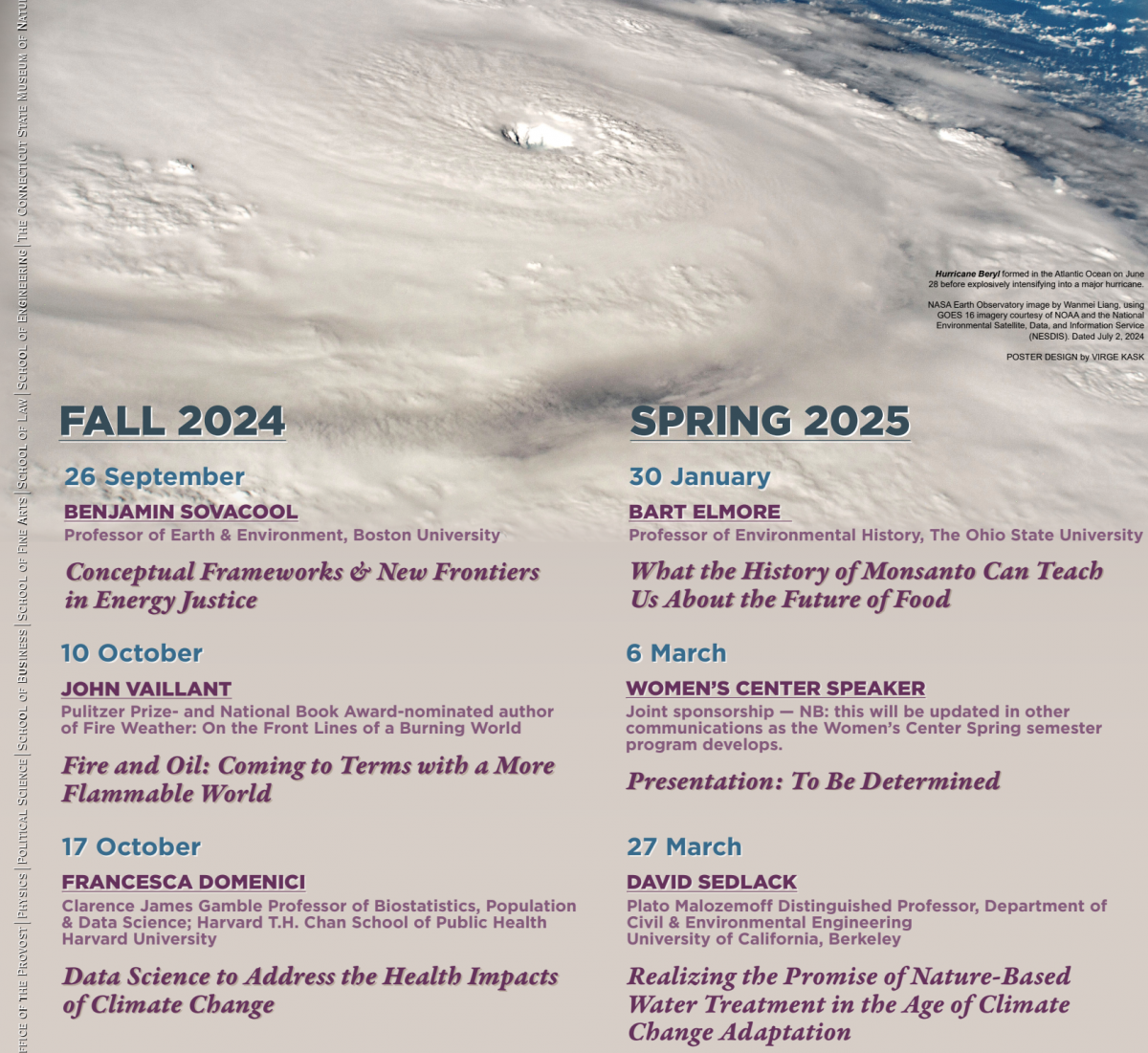
2024-2025 Teale Lecture Series
2024-2025 Teale Lecture Series “Realizing the Promise of Nature-Based Water Treatment in the Age of Climate Change Adaptation” March 27, 2025 David Sedlak Plato Malozemoff Professor of Environmental Engineering, University of California – Berkeley View recorded David Sedlak lecture “What the History of Monsanto Can Teach Us About the Future of Food” January 30, 2025 […]
[Read More]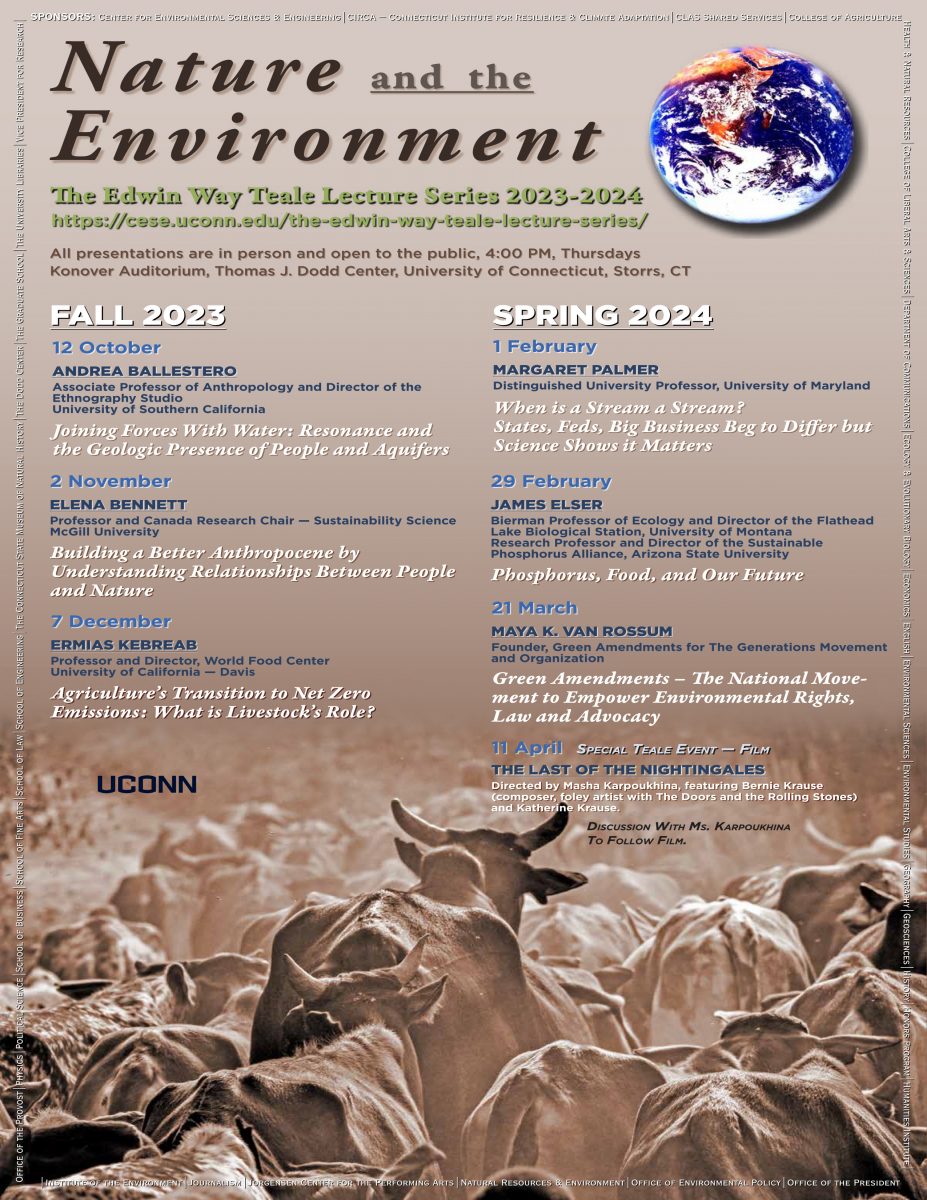
2023-2024 Teale Lecture Series
2023-2024 Teale Lecture Series “Joining Forces with Water: Resonance and the Geologic Presence of People and Aquifers” October 12, 2023 Andrea Ballestero Associate Professor of Anthropology and Director of the Ethnography Studio, University of Southern California View recorded Andrea Ballestero lecture. “Building a Better Anthropocene by Understanding Relationships Between People and Nature” November 2, 2023 […]
[Read More]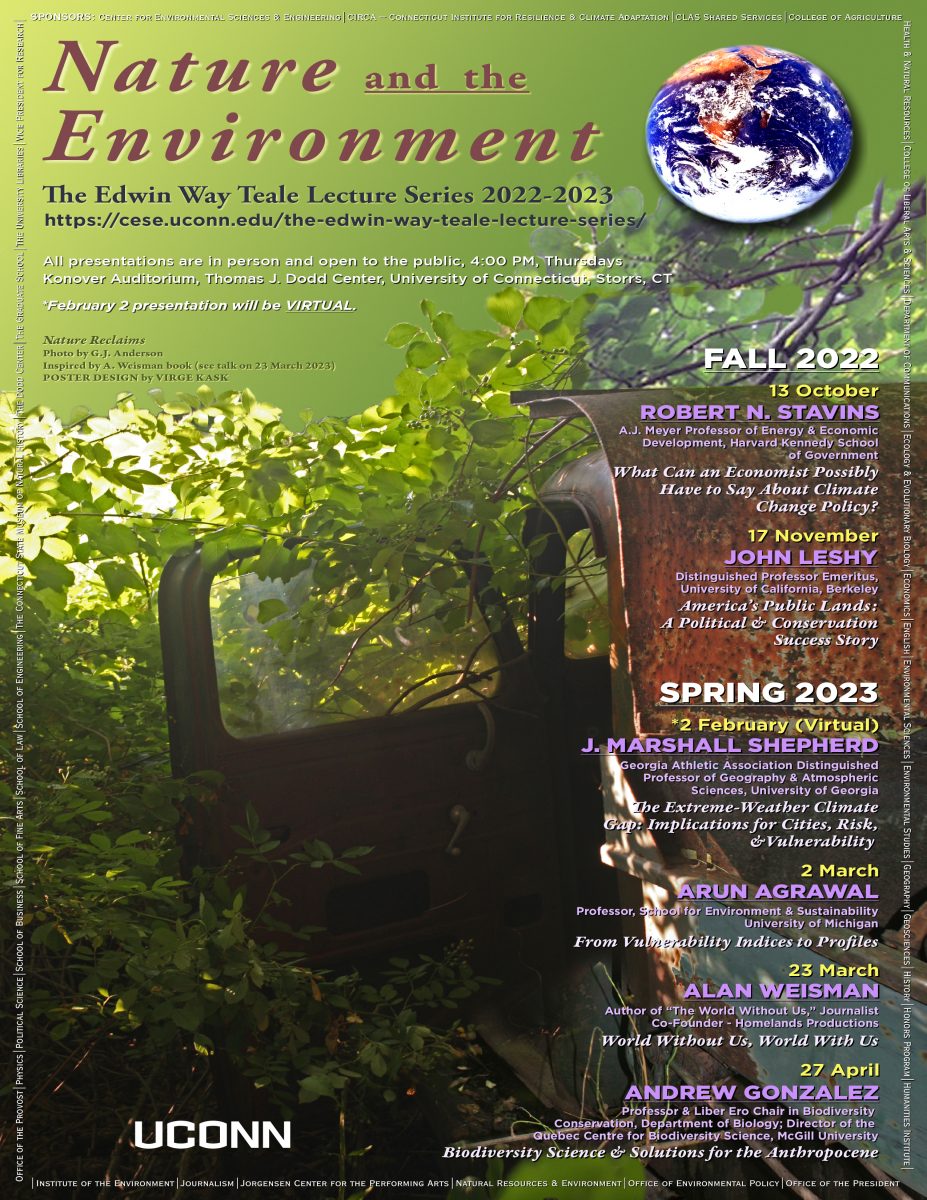
2022-2023 Teale Lecture Series
2022-2023 Teale Lecture Series “What Can an Economist Possibly Have to Say About Climate Change Policy?” 13 October 2022 Robert Stavins A.J. Meyer Professor of Energy & Economic Development, Harvard Kennedy School of Government View recorded Robert Stavins lecture. “America’s Public Lands: A Political & Conservation Success Story” 17 November 2022 John Leshy Distinguished Professor […]
[Read More]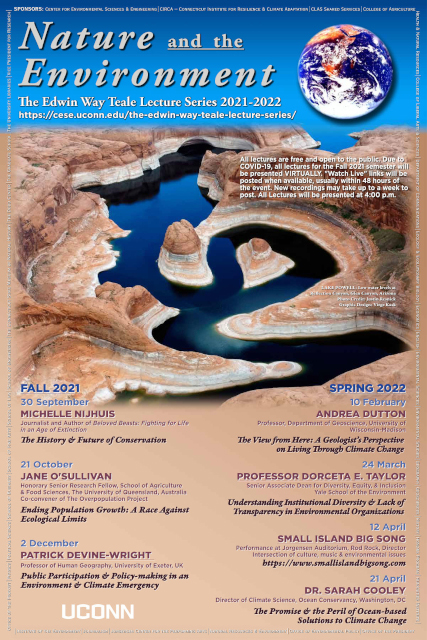
2021-2022 Teale Lecture Series
2021-2022 Teale Lecture Series 30 September 2021 “The History and Future of Conservation” Michelle Nijhuis Journalist and author of “Beloved Beasts: Fighting for Life in an Age of Extinction” View recorded Michelle Nijhuis Lecture 21 October 2021 “Ending Population Growth: A Race Against Ecological Limits” Jane O’Sullivan Honorary Senior Research Fellow, School of Agriculture and Food […]
[Read More]About Edwin Way Teale
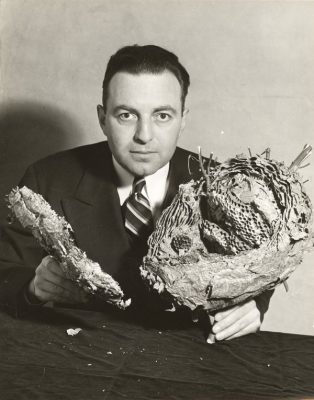 Edwin Alfred Teale was born in 1899 in Joliet, Illinois, and died in 1980 in Hampton, Connecticut. Personally, he lived the charmed life of an affable local nature writer who worked closely with his beloved wife Nellie at their old New England farmstead. Professionally, he was a forceful national advocate for respecting Nature, especially its power to teach us how to live. In 1945, he published a scathing critique of the insecticide DDT that helped inform Rachel Carson's book Silent Spring, whose 1962 publication marked America's turning point toward greater environmental awareness. Teale nurtured Carson's talent for sixteen years between 1949 and her death in 1964. In 1966 he became the first American to win the Pulitzer Prize for nature writing.
Edwin Alfred Teale was born in 1899 in Joliet, Illinois, and died in 1980 in Hampton, Connecticut. Personally, he lived the charmed life of an affable local nature writer who worked closely with his beloved wife Nellie at their old New England farmstead. Professionally, he was a forceful national advocate for respecting Nature, especially its power to teach us how to live. In 1945, he published a scathing critique of the insecticide DDT that helped inform Rachel Carson's book Silent Spring, whose 1962 publication marked America's turning point toward greater environmental awareness. Teale nurtured Carson's talent for sixteen years between 1949 and her death in 1964. In 1966 he became the first American to win the Pulitzer Prize for nature writing.
During the autumn of 1980, Edwin and Nellie donated their voluminous archive to the University of Connecticut. Today, these materials are housed within the Dodd Center where the Teale lectures are usually held. Preserved for posterity are: published books, articles, reviews; records of scientific societies; correspondence with key environmental leaders; voluminous private journals; and various awards, medals, and honorary degrees, including a record of his election as a fellow to the American Association for the Advancement of Science. This archive chronicles his life as a key founder of American environmentalism.
In 1921, Teale discovered a lifelong role model in the writings of Henry David Thoreau. In 1941, he quit his salaried day job as a magazine staff writer in New York City to become a full-time writer. In 1959, he relocated from the crowded suburbs of Long Island to the wooded highlands of eastern Connecticut, where he built a writing retreat modeled after Thoreau's famous experiment at Walden Pond.
By working independently from the 1940s through the 1970s, Edwin Way Teale was able to ignore the widening schism between the sciences and the humanities, and the narrowing and hardening of the STEM (science, technology, engineering, mathematics) disciplines. Our lecture series follows his example by featuring a smorgasbord of artists, scientists, writers, economists, filmmakers, politicians, philosophers, lawyers, archivists, journalists, and others.
Robert M. Thorson
Professor of Earth Sciences
The Teale Lecture Series is sponsored by:
Atmospheric Sciences Group
Center for Environmental Sciences & Engineering
Center of Biological Risk
CLAS Shared Services
College of Agriculture, Health and Natural Resources
College of Engineering
College of Liberal Arts and Sciences
Connecticut Institute for Resilience & Climate Adaptation
Connecticut Institute for Resilience and Climate Adaptation
Connecticut Sea Grant Program
Connecticut State Museum of Natural History
Department of Ecology & Evolutionary Biology
Department of Economics
Department of English
Department of Geography
Department of Geosciences
Department of History
Department of Natural Resources & the Environment
Department of Physics
Department of Political Science
Environmental Sciences Program
Environmental Studies Program
Honors Program
Human Rights Institute
Humanities Institute
Institute of the Environment and Energy
Office of Sustainability
Office of the President
Office of the Provost
Office of the Vice President for Research
School of Business, Graduate School
School of Fine Arts
School of Law
UConn Library